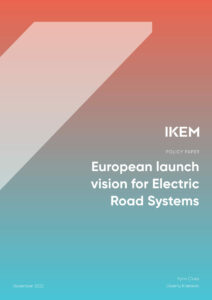In a study published today, IKEM examines scenarios and frameworks for the extensive implementation of electric road systems (ERS) in the EU. If appropriate preconditions are met, ERS has the potential to contribute to the decarbonisation of the transport sector by providing energy for heavy-duty transport. The study concludes that the European framework requires and supports emission reduction in the transport sector but does not include precise requirements regarding implementation.
Referring to the upcoming review process for the Alternatives Fuels Infrastructure Regulation (AFIR), study co-author Giverny Knezevic explained that the next few years will be significant for the development of ERS. ‘At this point, it’s still unknown whether ERS will play a major role in Europe and whether there will be any European agreement on ERS technology. The AFIR is important in this regard, because it can serve as a basis for the future regulation of ERS expansion.’
‘A pan-European decision on a technology track is desirable but improbable,’ said co-author Fynn Claes. Larger Member States bear a particular responsibility in this respect, he said: ‘States like Germany and France are better positioned to become European pioneers of ERS technology because of their economic power and interdependence. If they were to produce a joint ERS strategy, other states and their logistics sectors would likely follow.’
‘The EU could push this process forward with a coordinated stakeholder dialogue. Especially Member States like Poland, Czechia and Hungary should be involved. Although these countries aren’t yet active in the field of ERS, they will play a key role in the system’s deployment because of their locations along TEN-T-corridors,’ said Knezevic.
The study was carried out in the context of the AMELIE II project. IKEM and its partners are examinining issues including the legal and economic conditions required for the implementation and operation of overhead infrastructure on highways.






